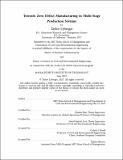Towards Zero Defect Manufacturing in Multi-Stage Production Systems
Author(s)
Lyberger, Taylor
DownloadThesis PDF (2.796Mb)
Advisor
Fine, Charles
Simchi-Levi, David
Terms of use
Metadata
Show full item recordAbstract
Implementation of quality improvement methods in multi-stage production systems is essential to manage and quickly eliminate manufacturing quality defects. Many companies tend to prioritize production speed rather than overall throughput, and are hypothesized to be below the optimal level of investment in quality systems when taking into account the full cost of bad quality. While traditional quality management techniques such as six sigma and process control are still valuable and worthwhile tools, recent advancements in technology offer manufacturers the opportunity to augment this tool set with the use of IoT, big data, and advanced analytics.
This thesis addresses the problem of how to build a modern quality manufacturing system that continuously reduces scrap and defect rates in the production process. The study adapts a zero defect manufacturing framework and applies it to the automotive manufacturing industry. Five key activities, including data collection, data integration, data analytics, process control, and defect mitigation are all found to be essential components in the development of a robust quality improvement infrastructure. The process of applying these framework components in the context of an automotive manufacturer’s production lines sheds light on both technical and operational challenges and benefits of the quality system enhancement process. Other manufacturers may find this analysis to be a relevant use case and template when constructing or making improvements to their own quality management architecture.
Date issued
2023-06Department
Sloan School of Management; Massachusetts Institute of Technology. Department of Civil and Environmental EngineeringPublisher
Massachusetts Institute of Technology